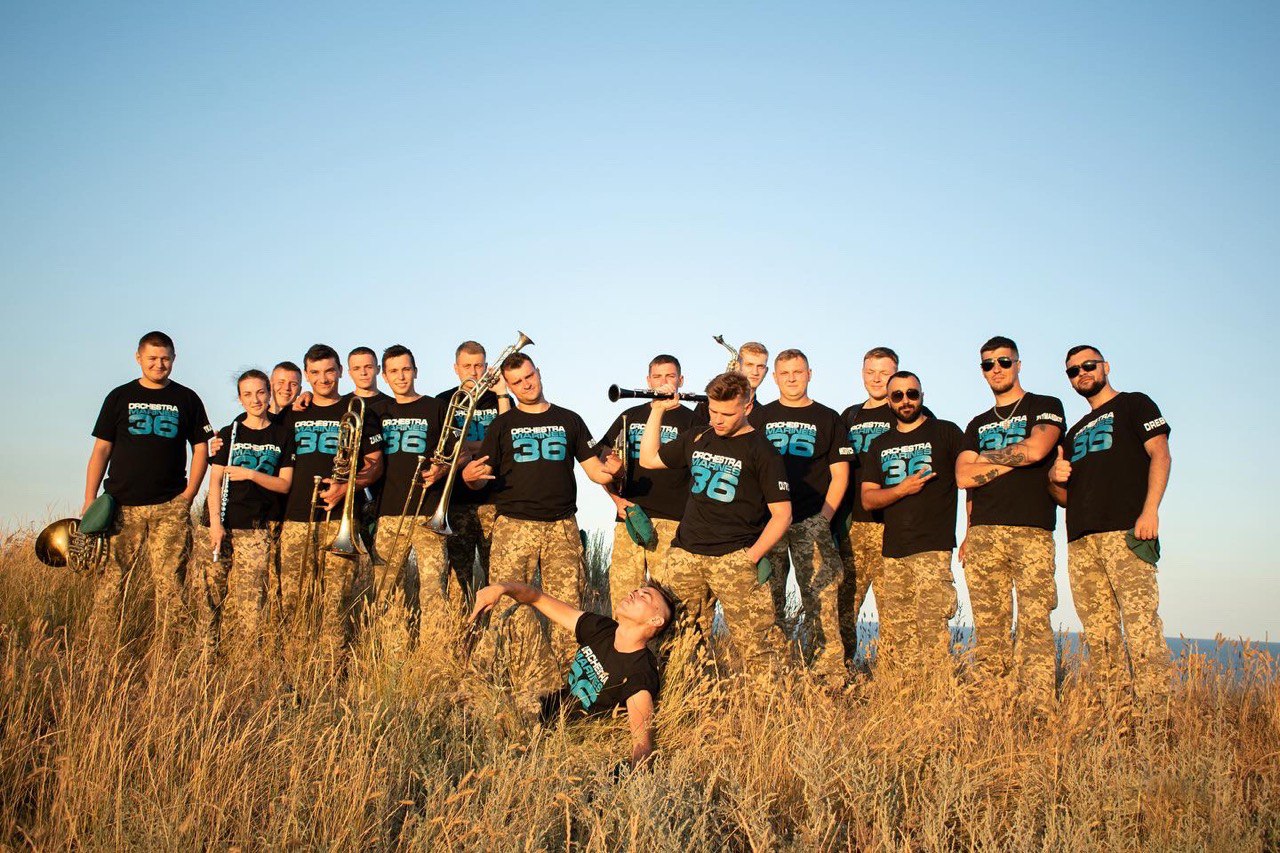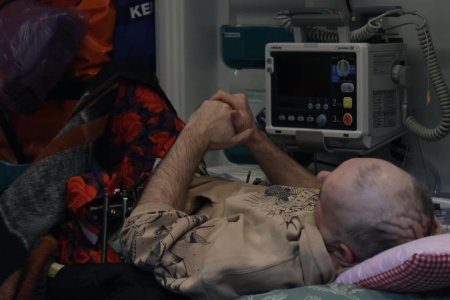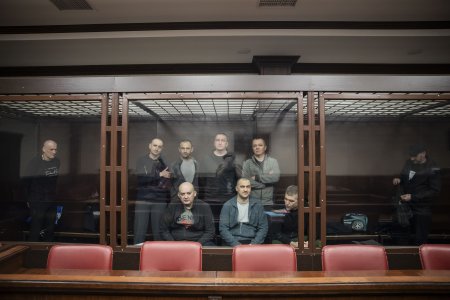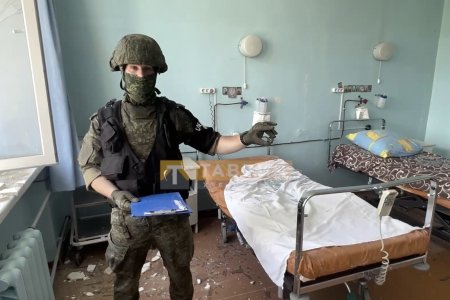
— Our orchestra was kind of a brotherhood where everyone could offer their own idea. We came up with a lot of interesting things and approached the performances informally: we performed interesting compositions, danced, and did somersaults in the process. We wrote the songs ourselves and were supposed to release an album, —recalls Serhiy. — We brilliantly reworked “Shchedryk” and were able to combine three styles of music performance. The plans were very far-reaching: in the south of Ukraine, we wanted to hold a flamboyant festival... We visited orphanages in the Mykolaiv region and performed for children.
The orchestra included several smaller ensembles — even its own rock band, “Suvora Dogana” (Severe Reprimand), which won the audience award at the California Fest ‘United by Song’ competition in the United States. The musicians were expected to perform in California. Instead, they found themselves in a war — and eventually in captivity.
From Mariupol to Mordovia
On December 5, 2021, the military orchestra of the 36th Marine Brigade deployed to Mariupol for a rotation — they traveled with their instruments, not to fight, but to perform for their comrades. When the full-scale invasion began, they managed to evacuate the orchestra’s only woman to Mykolaiv. The remaining 19 musicians, together with other brigade fighters, were besieged at the Ilyich Iron and Steel Works. Serhiy recalls that they faced a choice: retreat to Azovstal Plant or attempt to break through the encirclement.
— The commanders chose to break out rather than head to Azovstal, because the route to the plant ran across a bridge that couldn’t support the vehicles, the KamAZ trucks. Not everyone would have made it to Azovstal on foot… And overall, we decided it was better to die while breaking through toward home than at another plant. We attempted to break through twice. During the second attempt, we were taken captive.
The Ukrainians were first taken to Sartana nearby Mariupol, and a few days later transferred to the notorious Olenivka detention facility. Here, Serhiy was in the same barrack with all his musicians, except for one. The comrades still do not know where he is being held.
— In Olenivka, there was a “reception” (“reception” — usual intake, when newly arrived prisoners are beaten upon entering the detention facility — ed.), though not as cruel as the ones that we experienced later, in other places… The DPR people even warned us: “Guys, be patient — that’s how it is here.” They were afraid of us. We still wanted to escape then, and we even were thinking of removing two guards. We knew only a minority would have survived, but someone would … Someone could have reached ours. From there, it was 80 kilometers to our people, to the front line. But there, in the barrack, were various groups of prisoners: there were civilians, people from the Territorial Defense, and some of them were afraid; they did not agree (to escape — ed.). We did not escape.
In Olenivka, the living conditions were terrible: the prisoners slept on bare concrete, the windows were broken, and the toilet was simply the ground. Officers, military intelligence personnel, and tankers were transferred to Donetsk for interrogation — and Serhiy was among them.
— It is clear how the interrogation went. A few questions — who are you? what are you? — and then the “rehearsal” began. Although compared to what happened later, it was all child’s play. They beat us with rifle butts, with their hands, and with their feet. They tied a knot in a rope and beat us with it…
From Olenivka, the Ukrainian prisoners were gradually transported elsewhere. Some stayed in Olenivka for three days, some for five, some for six months. Serhiy stayed there for a week. The next place of his detention was Taganrog.
— The “reception” there was already harsher than in Olenivka. There it was intensified… There were Special Forces, the Federal Penitentiary Service, and not that many of us prisoners… They forced us to run a gauntlet, then they beat us separately. While you’re undressing, dressing, they take your blood, and they beat you constantly. With brass knuckles, bats, pipes, tasers… I was in Taganrog for a month. They took me for interrogation several times. They beat me constantly. There was one guy who was forced to rip off his tattoos. Later, in Mordovia, I heard that his leg had become badly infected…
Then, a pre-trial detention center in Novozybkov, Bryansk region. And again — torture, hunger, moral and physical abuse. They beat prisoner on the genitals.
— …It used to hurt so much that I couldn’t feel certain moments. I just started to feel nauseous and my stomach hurt… Then they dragged me and threw me into a cell. The guys didn’t even ask me anything; everything was written on my face.
Serhiy stayed in the Bryansk region for less than a year. After that, he was briefly sent to a colony in Pakino, Vladimir region. Here, although the Ukrainians were poorly fed, they were hardly beaten. Some, Serhiy says, even had their wounds healed. The Ukrainians hoped that they were being prepared for an exchange. Instead, after three and a half weeks, the prisoners were transferred to Mordovia’s Colony No. 10 — considered one of the most brutal in the Russian Federation. Former POWs speak of horrific torture, starvation, being forced to stand motionless for hours, unsanitary conditions, and the absence of medical care.
— In Mordovia, we barely survived the “reception”. They beat every part of the body they could. Our backs were every color — from red to purple and black. They beat us until we lost consciousness. The regime there required prisoners to stand, with cameras watching… You could go to the toilet only with permission. If anyone moved, they took the entire cell out and beat everyone. The guys were tortured: they poured water on us, put a bag over our heads, and strangled us. You lose consciousness, and then they bring you back to consciousness and beat you again. Some guys had their teeth knocked out. At first, I counted how many times I was beaten, but after a thousand, I lost count. They can beat you during a check, and then call you in for interrogation and beat you there. Their equipment couldn’t withstand it. Once, a taser was discharged on me, and they took out another. There was no medical treatment. Two pills for all diseases. They would only give something to asthmatics. They would say on Friday, “If you don’t die by Monday, maybe we’ll give you something!” People die there. It’s scary. They took bodies out of our floor… There was terrible food — there wasn’t enough of it — and the water was nasty. I weighed 92 kg before I was captured. On the fifth day after liberation, I weighed 60, which means I weighed about 57 kilos in Mordovia. It turns out that I lost 40 percent of my weight there. And some guys lost even more…
The prisoners were beaten for their torn clothes. They had to mend any holes themselves — even though they were given no needles, no thread, and certainly no scissors.
— Instead of needles, we used bones — chicken or fish. Chicken bones worked best. For thread, we pulled strands from our clothes: we unpicked seams that didn’t hold anything and removed threads we could spare. Without scissors, we bit our fingernails off with our teeth. As for toenails — we simply tore them off. There was blood, but there was no other way. Long nails grew in, tore through our socks, and we were issued only one pair per year…
Attitude towards musicians
Sviatoslav Saltykov, a saxophonist of the orchestra of the 36th ObrMP, died in Russian captivity. The Red Cross confirmed in the summer of 2022 that he was a prisoner of war. As MIPL journalists reported, in August 2022, Svyatoslav’s family received two letters from him. “I am young, strong, healthy, and I will survive. Sooner or later, I will return. Take care of yourself, and say hello to everyone. I love everyone and pray for you.” And in April 2023, Svyatoslav’s parents were informed that their son’s body had been returned to Ukraine. According to Russian documents, Svyatoslav died in November 2022 in SIZO No. 2 in the city of Kineshma. The Russians did not specify the cause of death, but his body showed signs of beating: a broken jaw, bleeding. The men who had been in captivity with Sviatoslav and were later released in prisoner exchanges said the Russians often forced him to sing Russian songs. ‘We suspect he stood up for someone, and that’s why they beat him so severely,’ his father, Serhiy Saltykov, said.
The status of a musicians offered the orchestral members no protection. At times, their connection to the world of art even became a separate pretext for torture.
— They ask: “What do you conduct with?” I say: “A conductor’s baton.” “And look, I have a conductor’s baton too!” And he takes out a 1.5-meter hose and starts hitting with it… They broke the musicians’ fingers. They also twisted my fingers on purpose… They damaged them, but the fingers healed over time. Apparently, there was a dislocation. And twice they struck me on the head. The first time they hit me for no reason. The second time, they remembered that I was a conductor and deliberately struck me in the ear. My eardrum ruptured. For about two months, pus kept draining from my ear. When I returned home, I couldn’t hear at all from one ear, and only a little from the other. The ENT doctor looked and said, “Wow, it’s like a grenade went off in here.”
The Russians forced Ukrainians to learn Russian songs, and a special requirement was to know the Russian anthem.
— For a long time, I didn’t learn their anthem and got beaten for it. I thought I could somehow get by… Even though, as a musician, I had played a dozen anthems and participated in military exercises like Sea Breeze, I didn’t know the Russian anthem — neither the words nor the music. In the pre-trial detention center in Novozybkov, I had no choice but to learn it because they wouldn’t leave me alone. They took me to interrogations because they didn’t believe I was a conductor and actually led an orchestra. For about five months, they beat me. I told them I couldn’t play any instruments. I had heard that one of the prisoners played the accordion, and even though I can play a little, I said I couldn’t. They didn’t believe that a conductor doesn’t play. I said, “I can only lead the orchestra!” They said, “Then sing!” “But I can’t sing either!” For that, they beat me as well. I just didn’t want to take part in it. I thought: when it becomes completely unbearable, we’ll deal with it…
Light in the Darkness
— In captivity, you want rather to be on the frontline, turn into a butterfly, die to avoid remaining in captivity, — says Serhiy. — You have no choice. Unless you swing at one of the guards so that they simply kill you. But it is better to lose your life on the positions, under other circumstances. That is why I did not allow myself this.
In order not to lose their mind and the remnants of their health, even in such conditions, Ukrainians tried to live life on their own terms, not the ones imposed by the jailers.
— I was exercising subtly, so that the blood was flowing a little through the body. It was easier to bear the beatings that way. We also did interesting things: we made backgammon out of bread. We tore out pages and made cards from books given to us. After dinner, we could sit for half an hour, then we would hide from the camera and play. We risked it.
The radio was constantly playing at high volume in the cell. They were spinning Russian patriotic songs over and over.
— They were launching their “Katyushas”, Gazmanov, but we managed to turn off the radio, although we were beaten several times for it.
The return of music
Serhiy Smirnov was released in an exchange on September 14, 2024. Five musicians from his group are still in captivity. The conductor says that the hardest part after being freed is knowing that some of their own remain there, in captivity.
— This weighs on most of the guys who return. It’s such a heavy moral burden. What we went through is something you wouldn’t wish on anyone. All former prisoners are sick in some way: some with tuberculosis, some with hepatitis, some mentally broken — people literally banging their heads against the wall.
Despite all this, Serhiy Smirnov does not rule out that the orchestra of the 36th separate marine brigade will still play on the big stage.
— I’m still waiting; the orchestra’s work is on pause. But half of my guys are already taking up instruments and gradually returning to music, while the rest are still in rehabilitation. Will there be performances? Let there be intrigue. Anything is possible.



